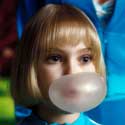
Charlie and the Chocolate Factory
directed by Tim Burton
starring Johnny Depp, Freddie Highmore, David Kelly, Christopher Lee
Warner Bros.
To remake a classic film is one thing, but to re-create a movie’s magic…well, that’s like trying to formulate an acceptable substitute for sugar.
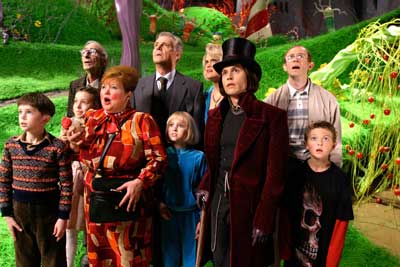
Ever-so-gifted Tim Burton’s Charlie and the Chocolate Factory, in many regards, is faithful to the original 1971 movie, Willy Wonka and the Chocolate Factory, and the book that inspired it. Charlie is an appealing bit of eye candy, and it’s worth the price of admission. Ultimately, however, Burton’s brand of chocolate is saccharine-sweet, with a strange and less-than-satisfying aftertaste.
Why, one might ask, would Warner Brothers attempt to remake such an unforgettable movie? One reason might have been to satisfy – once again – Burton’s obsession for author Roald Dahl’s wonderfully psychedelic creations; another would be to make lots of money.
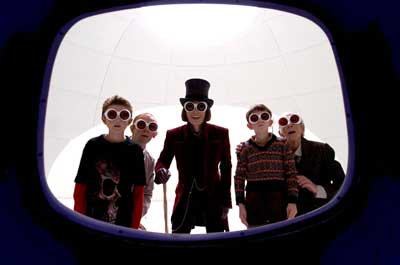
Charlie and the Chocolate Factory certainly succeeded in the first instance, and is sure to make loads and loads of cold, hard cash.
Amazingly, a great deal of the 1964 novel’s plot and line-for-line dialogue (Dahl was also the first film’s screenwriter) remains untouched in Burton’s version, which takes place in an expectedly wintry, dreary English town. Surrounded by relative wealth, a young, earnest and terribly poor boy named Charlie Bucket (Freddie Highmore, Finding Neverland) lives in a fantastically ramshackle home – basically a two-story lean-to – with his grandparents, mom (Helena Bonham Carter), and this time around, a father (Noah Taylor) who makes next to nothing working in the town’s toothpaste factory.
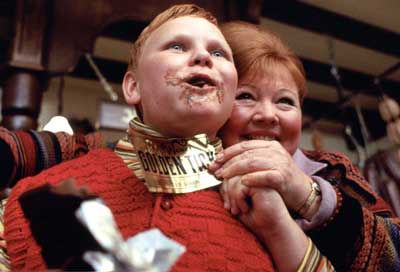
Charlie’s yearning for a Golden Ticket, as well as the world’s desperate search for the prizes, is almost identical to the original movie; Charlie’s Grandpa Joe (Waking Ned Devine’s David Kelly) in this film, is a former Wonka employee who wants the ticket almost as badly as his grandson. Much of the winners’ tour of the Wonka factory – and the factory itself – echoes the first film’s presentation, with computer animation replacing hand-crafted sets.
However, the decidedly unlucky children and their parents are even more wretched than their cinematic predecessors. For example, Augustus Gloop’s face is CGI-enhanced to appear even more hideously swollen, and the character of Mike TeeVee has been updated – he’s now a video game-addicted young psychopath with a dangerously high I.Q. The nasty little monsters’ fates mirror those of the original characters, as well, with the addition of a legion of devilish squirrels reportedly culled from Dahl’s book.
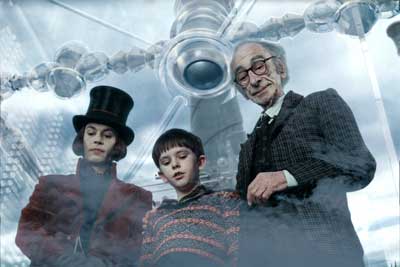
While Willy Wonka was technically a musical, Charlie and the Chocolate Factory definitely is not; the song-and-dance numbers are generally confined to the Oompa Loompas’ frenetic performances, with modern stylings (ranging from dance/techno and industrial to heavy metal, with mostly unintelligible lyrics) by – surprise, surprise – Danny Elfman. (And no, the tiny workmen are not dwarves in costume, as in the first film; the magic of CGI has allowed Burton to make dozens of politically correct copies of one very funny gentleman with a Far Eastern appearance, actor Deep Roy.)
The original, beautiful theme song is missing in Burton’s updated version, as is “I’ve Got A Golden Ticket” and the fantastic “Candy Man.” Sadly, gone with those songs is also the warm feeling one gets from hearing them. Also contributing to Charlie’s lack of feel-good fuzziness is Johnny Depp’s portrayal of Wonka as a pasty-faced, phobic victim, a typically offbeat performance reminiscent of his Ed Wood on tranquilizers, combined with his Edward Scissorhands’…well, weirdness.
In sharp contrast to Gene Wilder’s handling of his guests with a malevolent grin, Depp’s Wonka is intimidated by them – he eyes the children with a loathsome curiousity, and savages them with some hilarious one-liners.
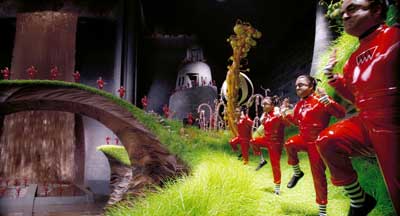
Burton’s fatal error, it seems, is the development of the Wonka character. In the original film, there was no development, per se; Wilder’s candy magnate was just a half-mad, occasionally terrifying, mysteriously magnificent benefactor. In the new version, Burton and screenwriter John August have invented a horrific childhood for Wonka, where the young man is traumatized, even tortured, by his insane dentist father (Christopher Lee). Of course, Wonka’s daddy issues are eventually resolved with the help of young Charlie; Burton tries to wrap all of the film’s messages up in a neat little bow at the end, but it just doesn’t work.
Instead of keeping it relatively simple, Burton has mucked it up with this father-son subplot, which spoiled whatever lasting magic the film could have possessed. Instead of being a great (and memorable) adaptation of a pretty trippy story about a poor boy’s dream being fulfilled, Charlie and the Chocolate Factory gets derailed into mediocrity by a filmmaking genius’ appetite for more. Mr. Burton should have listened to the original Oompa Loompas’ rhymes more closely.
Charlie and the Chocolate Factory: http://www.chocolatemovie.com












